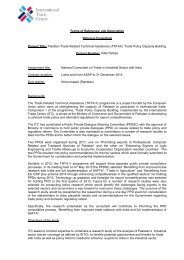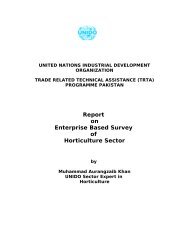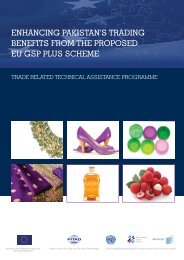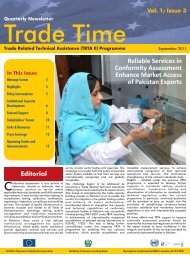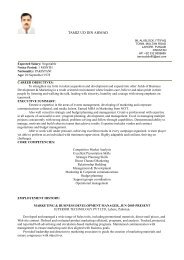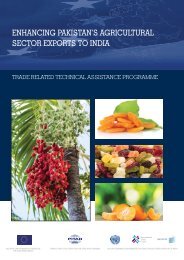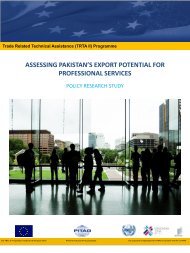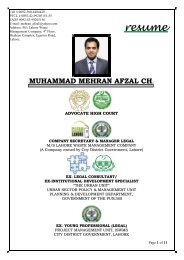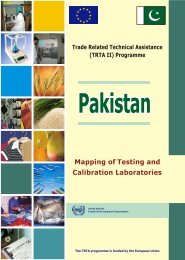Enhancing dairy sector export competitiveness - International Trade ...
Enhancing dairy sector export competitiveness - International Trade ...
Enhancing dairy sector export competitiveness - International Trade ...
Create successful ePaper yourself
Turn your PDF publications into a flip-book with our unique Google optimized e-Paper software.
ENHANCING DAIRY SECTOR EXPORT COMPETITIVENESS IN PAKISTANRegulatory Framework in the Dairy SectorThis section provides an overview of the regulatory framework that is relevant to the livestock <strong>sector</strong> inPakistan. These include the livestock (i) food safety laws, (ii) trade regulations and (iii) price regulations.Food SafetyThe Pure Food Ordinance, 1960This ordinance aims to consolidate and amend the available laws in relation to the preparation andmarketing of food. All the provinces including some northern territories have adopted this law with a fewamendments as per their suitability. The main objective of the law is to counter adultery in food supplied inthe market and ensure its purity.The law prohibits any person to mix, colour, stain or powder any food. The mixing would therefore beconsidered a violation of prescribed rules or would likely to make the food injurious for health. Theprescribed rules set out standards for colouring, preservatives, flavouring compounds, antioxidants,stabilizers, anti-caking agents, non-nutritive constituents, and metals. The law also prohibits the sale,preparation, manufacturing and import or <strong>export</strong> of food that is not suitable for human consumption and istreated as injurious to human health.The law also sets out rules for labelling of pre-packaged food, and precautionary measures to be takenduring storage, stocking and packing. Four criteria are adopted by the law to ensure purity of food; (i) itprohibits manufacturing/preparation or processing of food that is likely to be unsafe for humanconsumption, e.g., any food that can cause food poisoning; (ii) it prohibits import, <strong>export</strong> or sale of unsafefood; (iii) it sets out hygiene standards; and (iv) it provides for inspection and laboratory analysis of foodsamples according to set criteria.Local authorities are designated by the government for enforcement of the ordinance within theirjurisdictions. The law is not uniform in all areas and even the penalties for the same offense vary fromprovince to province. The law also does not provide for compensation standards or payment of damages toaggrieved consumers.Pakistan Hotels and Restaurant Act, 1976This law applies to all hotels and restaurants in Pakistan and seeks to control and regulate the rates andstandard of service(s) by hotels and restaurants. In addition to other provisions, under section 22(2), thesale of food or beverages that are contaminated, not prepared hygienically or served in utensils that arenot hygienic or clean is an offense. This law does not specifically mention consumers’ right to lodge acomplaint. However, this does not prevent any person from addressing a complaint to the controllerappointed by the Federal Government for enforcement of the act. Consideration of the complaint is amatter of jurisdiction of the controller. Moreover, as in other food laws, the act does not provide forcompensation to consumers in case of damage.The Pakistan Standards and Quality Control Authority Act, 1996Although being a relevant law, this law has not been notified as a food law. The Pakistan Standards andQuality Control Authority (PSQCA) Act provides for the establishment of the PSQCA which is the body forformulating standards or adopting international standards. It is also responsible for enforcement ofstandards in the whole of Pakistan and has the mandate to inspect and test products and servicesincluding food items for their quality, specification and characteristics during use and for import and <strong>export</strong>purposes.55



